
"You have a lot of courage to show up here!"
The Vengeful Beauty was a surprisingly entertaining martial arts film from 1978. Shaw Brothers movies could go either way during this time frame. Chen Ping more than held her own with the boys—Lo Lieh, Yueh Hua, Norman Chu, and Johnny Wang. Her character was pregnant and she still suffered no fools with a sword!Emperor Yong Zheng pretended to be a friend to the people all the while he was having ethical officials executed by the Flying Guillotines. And in a clear sign of tyranny, he orchestrated book burnings and the executions of anyone who wrote anything remotely critical about the imperial court. Rong Qiu Yan’s husband ran afoul of the emperor and while she was away honoring her deceased martial arts master with her junior, Wang Jun, Jin Gang Feng sent the Flying Guillotines to her house and eliminated everyone. On the run to protect the child she was carrying she came across Ma Sen working at an inn. Brother Ma was also on the run as he had been a Flying Guillotine but could no longer stomach the murder of innocents. He joined her as well as Wang Jun when Jin sent his lethal children after them.
Qiu Yan was smart and could take care of herself. Chen Ping brought a nice depth of emotion to the vengeful and pregnant heroine battling assassins. After one bit part in the original Guillotine film and his scenes cut in the second, it was good to see Norman Chu in a leading role as an ex-Flying Guillotine. He had to endure an atrocious wig in order to do it though. I almost didn’t recognize him because he looked so young—no wonder, he was only 23 at the time! Lo Lieh in a gray wig played the leader of the Flying Guillotines. He gave a strong performance as a father whose children were eliminated one by one.
The sword fighting was average for the time frame, a lot of swipe and falls, but still fun to watch. The flying guillotine, one of the strangest of kung fu weapons, made a couple of appearances in this a loose sequel. There was some wire work and reverse filming, nothing over the top and edited fairly seamlessly into the fight scenes. One fight included a topless Susan Yam Yam Shaw which weirdly didn’t feel too gratuitous. There was also a battle high in the bamboo long before Crouching Tiger, Hidden Dragon and The House of Flying Daggers.
The Vengeful Beauty benefited from a well written story by Szeto On. There was no shortage of vengeance and deaths, yet this story didn’t feel like it was hastily sewn together with tropes from a hundred other kung fu films. Most importantly to me, Szeto let the heroine struggle and shine. Qiu Yan was fierce and vulnerable. Kung fu movies would soon be taken over by mostly male casts, so every competent female warrior feels like finding a gem.
7 March 2024
Was this review helpful to you?
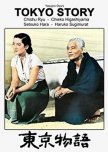
This review may contain spoilers
"Life is like that"
Tokyo Story is a quintessentially Ozu film. The story about the dissolution of a family was emotional without being dramatic. Every frame was composed with the utmost care as if evoking a painting. Shot from the mat, the camera never moved, only the people, drawing the viewer in for an intimate window into this troubled family’s life.“Be a good son while your parents are alive. None can serve his parents beyond the grave.”
Retired couple, Shukichi and Tomi, make the long, arduous trip from their southern fishing village to Tokyo to visit their children. Due to the distance it has been years since they’ve seen each other. Instead of greeting their parents/grandparents with open arms, everyone seems put out that their lives and households are being disrupted. Shige, the eldest daughter, pawns them off on the couple’s widowed daughter-in-law, Noriko. Unlike their flesh and blood children, Noriko takes the day off and shows them the town, treating them with great care and respect. Afterwards, Shige and her brother Koichi, pool their money and send their parents to a seaside spa. The spa ends up being a loud hangout for young people causing the elderly couple to return to Shige’s the next day. She’s upset that they returned early because she has a party planned leaving the couple literally out on a curb. Noriko takes in her mother-in-law while Shukichi has a reunion with old friends and goes out drinking and reminiscing. Realizing they are a burden on their children, the couple boards the train the next day to go home. They are able to see their middle son who works at the Osaka railroad when Tomi becomes ill on the train and has to disembark there. Satisfied they have seen all of their children for possibly the last time, the parents state that their children may not have lived up to their expectations, but they are better than most leaving them satisfied.
“To lose one’s children is hard, but living with them isn’t easy either.”
Ozu never truly goes into why the children are not only distant but disrespectful as well. The father drank heavily when they were younger, whether that caused a lingering anger he wasn’t telling. Despite Noriko being a dutiful daughter-in-law and widow, her short marriage to Shoji eight years ago was a difficult one for he also drank heavily. Shige grated from beginning to end, always finding fault, never giving an inch. When her husband brings home expensive cakes for her parents, she scolds him that the delicacies are too good for them and then eats the cakes herself! Yet Ozu and the characters simply accept her as she is, never calling her out for her rude behavior. It is what it is.
“Isn’t life disappointing?”
The grown children’s lives are busy as they hustle to make a living in a town with too many people after the war striving for the same thing. Their children reflect the same attitude as their parents, they are rude and disinterested as well. Every generation of the family is disintegrating, held together by memories and tenuous traditions. The father states, “Life is like that.” Death happens. People forget. People move on. Relationships are always in a state of constant flux as people change, suffer, succeed, fail, grow older. Families, like marriages, require emotional upkeep to stay together and relevant, something this family has neglected. Life was also taken for granted, the thought that their parents would always be around. When death visits, the children still can only think of themselves and their lives with only Noriko going out of her way to help. Stay busy, stay moving, and you don’t have to think about the difficult things in life.
“Isn’t life too short?”
Tokyo Story is one of Ozu’s more beautifully shot films, and one that took the viewer beyond a small world. From the parents’ fishing village to Tokyo, we’re taken along with the parents to discover new sights. The music is subtle, just like Ozu, perfectly setting the tone when used. School children sang just as the story needed a bolus of hope. Often only the rhythmic sounds of nature were used or mechanical as with a ticking clock when a character realized all he had was time left. Despite the larger world the characters inhabited his meditative rooms and pauses still reigned supreme. Ozu’s beloved train began the film as the parents journeyed on their last trip to see their children and a train ended the film as a character was freed from her guilt and allowed to embrace a new future.
Everyone ages. Relationships change. Children become parents and then grandparents themselves. Life involves death, irrespective of age. Loneliness is a harsh mistress. I hope Ozu’s assessment that life is disappointing and everyone will eventually not only suffer from alienation but also cause it isn’t inevitable.
2 February 2024
Was this review helpful to you?

"You've just been taking everything for granted"
Death’s Game at first glance appears to be a simple repudiation of suicide. Death’s thin skin takes it personally when Choi Yi Jae said he wasn't afraid of her and as she says, “You are guilty of coming to find me before I came to find you.” At second or even seventh glance as Choi is doomed to be reincarnated into 12 lives on the cusp of death, a grander scheme begins to reveal itself.Choi Yi Jae was having a bad week, preceded by a tough seven years. When he made the ill-fated decision to jump from a roof he found out just how bad things could get when he met a disgruntled Death who decided to teach him a lesson by having him reincarnate into 12 different lives at the end of their span. Some of the lives were over in a blink, others were further developed. Each reincarnation showed how other lives were suffering or prematurely cut off. They also showed how his own limited thinking and actions led to fateful outcomes. Choi’s myopic vision never let him see how his actions affected others or the dangers lurking about him. I’m looking forward to his growth as a character in the next four episodes.
I had not perused the cast list and was shocked at how many famous faces appeared in Choi’s different lives. These actors weren’t phoning it in either, they gave performances worthy of their own characters’ dramas. It will be interesting to watch Choi finally begin to pull together the different experiences to comprehend what he needs to learn to save his life and afterlife. He’s going to have to move past being cocky and self-absorbed if he wants to win Death’s Game. He’s finding that “wherever you go, there you are.” And I’m not sure the reason for the game is the one he thinks it is. As Choi and the audience come to see how at least some of the lives are interconnected, the goal posts may be moving in regards to what his motivations will be. Admittedly, a few of the revelations were not shocking and I was waiting on them to finally be shown. There was one that should have been a tear jerker or shocking but when it happened, I burst out laughing in the way it was overplayed. For the most part, the short life experiences were moving and effective.
Death's Game is one of those thrillers that felt more like a shell game. Nothing was quite what it seemed and I don't think the real meaning of the episodes or even his death will be fully understood until the second half plays out in January 2024. I hope the next four episodes are as tightly written and as well acted as the first four.
28 December 2023
Was this review helpful to you?
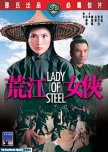
This review may contain spoilers
Lady of Steel was the first of two Shaw Brothers films Cheng Pei Pei made in 1970. While Pei Pei shone like a jewel the action and story were rather lackluster.Fang Ning and Chao Hsiung stop at an inn on their way to delivering one million taels of silver to flood victims. The nefarious bandit Han Shi Xiong not only robs them but murders Fang and his family. Chao manages to escape with the youngest Fang daughter. After he dies in the woods, Priest Xuan Zhen takes Ying Qi in and teaches her martial arts. This was before the invention of the training montage which means Ying Qi ages in a matter of seconds and has also become an accomplished swordswoman. She desires revenge against Han but first she’ll have to deal with the Jins who have invaded. On the way to the Flying Dragon Fortress with her letter of introduction she ends up in a fight with a beggar clan who is threatening Wei Tong Ming. She jumps to his defense not knowing he was in league with Han. This pits her against the Beggar leader until she realizes he is the good guy and Wei is the bad guy. Wei also discovers her secret and tells Han who is now called Cai Yi and is duplicitously working with the righteous leader of the Flying Dragon Fortress! From there Ying Qi must face double crosses, multiple ambushes, and wear several disguises until she finally uncovers the truth and acts on her revenge.
Cheng Pei Pei had the opportunity to show off some of her acting skills as she dealt with treachery and took on several different personas. Yueh Hua was a supporting character who only showed up briefly when Ying Qi needed him. Huang Tsung Hsun and Lee Wan Chung made for devious villains. The standard revenge plot was thin and redundant more often than not. Although there were many fights, for the most part they were rather dull. They used the swipe and fall style of choreography with the assistance of some wire work. Cheng Pei Pei and Yueh Hua had a flirty fight in the beginning. Her fight with Lee Wan Chung during a fireworks display had some colorful flashes as the fireworks wrote out “longevity.” There were a few moments of inventiveness in the finale, but even those times were few.
Through no fault of Cheng Pei Pei’s, Lady of Steel wasn’t bad, it was just the kind of lukewarm film I’ll forget very soon because it didn’t have anything memorable going for it. Her next film, Brothers Five, had well choreographed fights and more charismatic characters if you need a better Pei Pei film to watch.
13 Dec 2023
Was this review helpful to you?
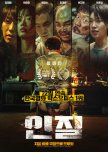
This review may contain spoilers
No honor among thieves or kidnappers
Hostage: Missing Celebrity attempted to be an edgy kidnapping story using Hwang Jung Min to play himself as the victim. With uneven casting and an otherwise formulaic story it over relied on its star to create an intriguing film.Hwang Jung Min played himself in the film which was a rather odd meta-angle. While his actual movies were mentioned, the character was clearly fictional. Hwang is shown as being humble, good to his employee, and shops just like the little people do at a convenience store. Upon leaving the store he finds three hooligans sitting on his expensive car and that is where his troubles begin. When he awakens tied to a chair, Hwang realizes that the kidnappers have not covered their faces which means they likely plan to kill him and another kidnap victim after they receive the ransoms. He puts his movie experience playing characters in precarious situations into action. Before long, the kidnappers come to understand that snatching someone famous puts more pressure on the police to find the missing movie star quickly and the countdown is sped up.
Hwang gave a superb performance as a wealthy actor who lived a comfortable life suddenly being thrust into a dire situation. He portrayed a wide range of emotions as the kidnappers delighted in physically and emotionally tormenting him. He also showed the character’s frustration and resiliency when he tried to escape and when those efforts failed, used the age-old ploy of turning the kidnappers against each other. Ban So Yeon played a young woman whose life was in the balance due to her kidnapped boss being brutally murdered and dismembered after failing to come up with their ransom. She gave Hwang an ally and someone to protect as well. The actress didn’t have much to do but look scared and stick close to Hwang. When using a familiar story formula, a captivating villain is a must. Unfortunately, Kim Jae Beom as the lead villain gave a rather lackluster performance as the murderous psychopath capable of almost anything. Ryu Kyung Soo and Lee Ho Jung weren’t afraid to chew on the scenery in their roles as villainous lovers. The police officers as well as the other villains were largely forgettable.
Though the running time was only 90 minutes it seemed longer as the story became redundant especially near the end. Most of the time those faults were often overcome by Hwang’s onscreen charisma and the rapid pace of the action. The film would have been greatly strengthened had Hwang been given an equally engaging actor to spar with. If the kidnappers had been driven to their cruelty by pertinent and timely social issues it would have added depth to the story, too. They were for the most part thinly drawn psychopaths who worked together in targeting expensive car owners. Hostage: Missing Celebrity for the most part was an entertaining if flawed movie that relied too heavily on its star to conceal the missing thriller aspect of this thriller.
11/23/23
Was this review helpful to you?
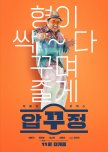
This review may contain spoilers
"One must earn like a dog and spend like a beast"
The Men of Plastic was a comedy about greedy men and women willing to scam patients and double-cross each other in order to get ahead. While the cast was strong, the storytelling was not.Kang Dae Gook (Ma Dong Seok) is a hustler and facilitator in his neighborhood, closely affiliated with his old high school friend, gangster Cho Tae Chun. When he discovers Tae Chun meeting with an unlicensed plastic surgeon who does ghost surgeries, he takes the opportunity to make a business deal with Tae Chun and Park Ji Woo (Jung Kyung Ho), the surgeon. He enlists buddy Mi Jung (Oh Na Ra) and before long the crew is bringing in money hand over fist. In order to make some legal issues go away they end up approaching the sketchy Gyu Ok (Oh Yeon Seo) and doing business with her. It doesn’t take long for the scammers to get scammed.
I’m a big fan of Ma Dong Seok and enjoy watching Jung and Oh as well. Ma’s primary character trait was wearing loud shirts and mismatched hats and initially he sported a fiery pink-red hair dye. This was not one of Jung Kyung Ho’s stronger performances, largely due to his character’s cold, untrusting nature. A strong bromance would have helped this movie enormously but the two men never seemed to trust or like each other. Most of the characters were hard to feel anything sympathy for. The one bright spot was Oh Na Ra. She brought an effervescent energy badly needed when she was onscreen.
South Korea has the highest per capita amount of plastic surgery done in the world. Nearly 1 in 3 Koreans will have some work done on themselves often by the age of 21. The movie was set in 2007 and the team was encouraging medical tourism. As of July 2023 (post-pandemic lower numbers), around 82,000 foreigners visit Korea for various beauty treatments and surgeries. The fierce competition for clients was touched on with Ji Woo being the victim of a “surgical hit job”. There was no introspection or comedic rumination on why the waiting room was always filled with young women who felt the need to hand over large sums of money to improve their looks. This was strictly a by the book routine comedy.
Men of Plastic could well have described many of the characters as they were difficult to care about even when they were about to lose everything. At nearly 2 hours, this film dragged rather badly at times. If plastic surgery fascinates you or you are a fan of the cast you might want to check it out, but otherwise it’s one that can be skipped or as it will be soon in my case—forgotten.
11/18/23
Was this review helpful to you?

Kim Sun Yi along with her mother and sister move into a house in a remote rural area. Their landlord is the “slimeball”, Ji Tae. Not long after settling in Sun Yi discovers a feral young man hiding next to a shed. He wolfs down the food her mother gives him. Unlike so many rigid Korean mothers in dramas, open-hearted Ok Hui takes the stranger into their home. With 60,000 orphans from the war, it wasn’t a leap of imagination to think he had been abandoned and left to fend for himself. She gives him the name Cheol Su. Sun Yi takes it upon herself to train Cheol Su like a puppy with good results. “Wait” comes to mean many things as the story progresses. As Cheol becomes more civilized she begins to teach him to read and write. Ji Tae comes to resent Cheol Su’s protective nature whenever he attempts to put the moves on Sun Yi which leads to dire consequences and a bizarre wartime experimentation revelation.
I enjoyed Park Bo Young and Soon Joong Ki’s performances. It was refreshing to watch them when they acted freer and more natural than their more crystallized on brand performances in recent years. Jang Young Nam has great depth as an actress and it showed in this film, too. Yoo Yeon Seok was given the tough job of playing Ji Tae, a character with zero nuance and an animal far more dangerous than a wolf.
A Werewolf Boy was a chaste romantic coming of age tale set in a beautiful bucolic setting. Promises were kept and broken, something unavoidable on the road to adulthood. It veered in and out of fantasy, showing once again that the worst monsters are actually human beings.
10/27/23
Was this review helpful to you?
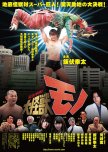
This review may contain spoilers
Royal rumble!
Kaiju Mono flipped Kaiju parodies on their head and then slammed them with a DDT. In the opening scenes, reports of violent weather, earthquakes, and volcanic eruptions were explained as Mother Nature not taking our BS anymore. Kaiju Mono came as a warning. Filled with sexual innuendo and a monster that hunted virgins of any sex, this film didn’t try to take itself seriously or make sense at any point. Somehow it also managed to be ridiculously funny even when it was completely inappropriate at times.Kaiju Mono was an underground dweller who came to the surface when she needed snacks or to take her anger out on humans. Deep in the woods, two lab assistants came across a strange egg where a bizarre incident connected to Mono had just occurred. When the monster decided to go on a rampage and head toward Tokyo, Dr. Jotoro, a Sailor Moon cosplayer and scientist, developed a serum that would make his skinny lab assistant a giant, muscled Titan. Dr. Jotoro had also developed expandable briefs so that Nita wouldn’t have to wrestle nude, much to the chagrin of the ladies watching the downtown battle. Nita managed to drive Mono away and instantly became a celebrity, especially since his muscles remained after returning to normal size. When Mono once again stomped into town looking for her egg, she thrashed Nita, causing Dr. J to have to work on a new formula for him.
Nita had three different iterations, each bigger and badder and played by three different actors. The wrestling scenes were funny and fairly acrobatic for the limited space they fought in. The movie made fun of the military, protestors, industrial espionage, the fickleness of fame, and the news media. No one was immune to their zingers and Mono’s chomping. The film did show the benefit of older people when another hero emerged. As the movie explained for the non-Japanese audience, the original Ultraman made a guest appearance. The biggest drawback for me, other than some draggy moments in the middle, were a few gay and cross-dressing jokes that have not aged well.
“Will this lead to a glorious future or man’s extinction?” Kaiju Mono didn’t answer that question or any others, but it didn’t need to. Director Kawasaki playfully poked fun at Godzilla movie tropes and created some solid laughs throughout the film. This film isn’t for everyone, it helps if you enjoy Kaiju films, pro wrestling, and irreverent humor. Silly and never taking itself seriously, Kaiju Mono managed to not lay an egg.
10/24/23
Was this review helpful to you?
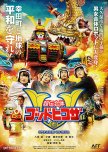
This review may contain spoilers
If you are feeling nostalgic for something akin to the Power Rangers or going further back, Sigmund the Sea Monster, Super Legend God Hikoza might be what you are looking for. It would also help if you are twelve-years-old or younger, you might not notice how bad the writing and acting for this film were.Four scientists work for Dr. (Dr. what? They never mentioned his name, maybe it was Dr. Doctor) at the UISAS (Ultra Institute Space and Astronaut Science). Takao and Okubo are childhood friends who bicker nonstop largely because Takao berates him and hits him almost continuously. The other characters with the exception of Yoshiki find it charming. Yoshiki is in love with Takao and the new hire Yuria is in love with Yoshiki. It’s like a junior high school only less mature. When Takao knocks Okubo down at a temple, he falls on a 400 year old doll. While the two are fighting over it they are brought inside the doll just as an evil giant fish attacks. After beating the fish back, they go on to learn more about the god Hikoza whose remaining consciousness resides in the doll and his relationship to the friendly aliens called Godnes. Four centuries ago, the evil alien Shachihokon attacked and Hikoza managed to seal him until the present time when he was released and took over some poor guy with a bowl haircut. After defeating Catfish dude, the Bickersons become celebrities and go on the talk show circuit, make commercials and even guest star in a Kota/Power Rangers episode. But they are celebrating too early for Shachihokon has dirty tricks up his sleeve and the four scientists will have to grow up quickly to defeat him.
I thought maybe the date on the film was incorrect. This felt more like 1980’s television than a 2020 movie regardless of how tongue-in-cheek it might have been. The acting, sets, and writing were awful. Takao was particularly childish and a bully. The rest of the four were equally as childish, just not as physical. Shachihokon’s costume was pretty hilarious especially when he used his special tongue power. The catfish monster was reminiscent of Friend’s Hannukah Armadillo. Hikoza’s early costume looked like a trash can with arms and legs although the final Hikoza costume had a nice samurai effect.
This film was primitive looking and the big final battle felt more like an Afterschool Special on the value of communication and how to deal with your feelings. If you loved/love Power Rangers and are longing for something like it, this is definitely a film to try. If you are content to leave campy costumes and posing behind, best to avoid Super Legend God Hikoza.
10/21/23
Was this review helpful to you?
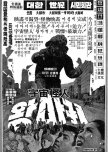
This review may contain spoilers
Korea's oldest surviving Kaiju movie
Space Monster Wangmagwi is the oldest surviving Korean Kaiju film. It also boasts one of the largest cast of extras for any film coming in around 160,000. The Koreans put their own stamp on a rampaging monster tearing up a capital city while the military watches powerlessly genre.Bride-to-be Ahn Hee and pilot Jeong Hwan are celebrating the eve of their long-awaited wedding when Jeong Hwan is called back to his base. What everyone is about to find out is that aliens are orbiting the Earth and have unleashed a monster in their quest to conquer the planet. Even with people running around screaming and abandoning her wedding day, Ahn Hee dresses for her event, even having her hair done until the stylist scurries away. When she realizes no one is coming, not even the groom, she and her mother decide to leave as the monster slowly approaches them. Each one took turns falling down over and over again, in order to give the ugliest Kaiju in Kaiju history time to catch up. Ahn Hee is grabbed by the monster a la Fay Wray in King Kong style. A young street boy named Squirrel, who has stolen food and a knife from a deserted house decides to run up the monster instead of running away. The boy takes matters into his own hands and does more good in thwarting the aliens’ objectives than the military and civilian forces combined.
Space Monster Wangmagwi was quintessentially Korean. Instead of focusing on a handful of characters directly involved with stopping a monster, SPW had a series of vignettes that had nothing to do with saving the world. Some of the things you would never see in a Japanese Kaiju film included—a long pooping scenario, several instances of theft, child birthing, and two idiots betting about different things during the catastrophe and wagering everything including one man’s wife. There were also copious amounts of tears.
The building miniatures were exquisite as was the rubble, looking far more believable than some of the cardboard towns Toho was using at this time. I thought at first they were using forced perspective or some other film magic and then the monster would lean against one of the buildings or start tearing it down. Very impressive work. Too bad they didn’t put the same care into the monster suit. I didn’t think anything could top the moth-eaten Kong suit in King Kong vs Godzilla (1962), then Wangmagwi said, “Hold my beer.” The costume looked like a flight suit covered in cow dung, I hate to be crude but that’s the first thought that came to my mind. Wangmagwi also seemed to forget that he was holding a human in one hand when he was beating on buildings. The Gamma aliens weren’t much better, they wore what appeared to be dented gold buckets on their heads. And when the spaceship was flying the wires showed as it wobbled. The science was bizarre. Due to different gravity from the home world, the monster grew 500 times his size when dumped on Earth. Setting aside the absurdity of that “science,” wouldn’t the aliens have become gigantic as well, making settling the planet awkward?
My favorite part of the movie would usually be my least favorite. There have been many Gamera movies where I hoped the giant turtle would snack on an annoying child. Squirrel may have been cocky but he was cleverly proactive. The precocious thief’s actions, and not the military, saved the day. His maneuvers also pointed out how slow-witted the aliens were. The aliens only fear of the military was that they would trash the neighborhood and leave the planet uninhabitable for the conquerors.
I enjoyed having the chance to watch this film that was largely unavailable for decades. I might not have relished the poop and wife betting comedy, but I was happy to see this piece of Korea’s Kaiju film history.
10/19/23
Was this review helpful to you?
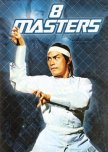
This review may contain spoilers
"Keep the peace, have patience, forgive an offense" and watch out for those hopping vampires!
Carter Wong took on The 8 Masters, bronze men, as well as a room full of hopping vampires. What more could you ask for in a kung fu flick?When his father is killed by the 8 Masters, young Chu Shiao Chieh is rushed to a Shaolin temple by his father’s dying friend, Chou. The monks take Chu in and teach him the art of kung fu. When he matures, he is tested by deadly traps and the notorious bronze men. After passing the tests he is released into the world to pay his debt to Chou’s family for the sacrifice he made. The wise monk admonishes him to, “Keep the peace, have patience, forgive an offense.” When Chu returns home, he finds that his mother is blind and Chou’s daughter is living with his mother. Chu doesn’t even have time to unpack his suitcase before the 8 come calling, all wanting a duel to settle their debts with his father. How long can he hold out before granting their demands?
Carter Wong was never a great actor, but he was fun to watch and not too stiff in this role. The movie started out promising with kung fu training and the fights during his Shaolin trials. Once he left the temple the energy dropped precipitously. Watching him beaten and refusing to fight repeatedly until tragedy struck became tiresome. When he finally took on the 8 Masters one at a time during the last 30 minutes the movie picked up again. He battled Phillip Ko Fei, Lu Ping, hopping vampires, and Chia Ling to name a few. Chia’s character held a secret, key to the movie as did Doris Lung Erh’s. I gave the movie a .5 bump for the cast and the hopping vampires.
Director Joseph Kuo filmed much of the first half of the movie in night scenes making it hard to see what was happening. When Chu finally relented and took on the masters, viewers were given a scenic tour of the area-a mountaintop, the beach, a river, and forest. The version I watched was cropped and dubbed, none of which was the filmmaker’s fault. When movies have been cropped, dubbing is sometimes a necessary evil as the subtitles tend to run off the screen.
The fights used a variety of weapons even when Chu took on everyone without one. There were times with the camera zoomed in too close and the fights undercranked, the action was blurred and the moves obscured. I much preferred when the scenes played out where the different styles could be observed.
The 8 Masters would have been a much better film if Kuo could have kept the pacing up throughout the story instead of bringing it to a screeching halt in the middle. Despite the lull, it was nice to have a loving mother-son story, a rarity in kung fu flicks. And if nothing else, there were bronze men and hopping vampires to shake things up.
10/16/23
Was this review helpful to you?
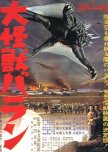
This review may contain spoilers
Varan was a patchwork monster of a movie. Production was originally for a 3-part co-produced limited television series. When the American production company involved fell apart, Toho decided to make it into a feature movie. With a shoestring budget, filmed in black and white for television (no color sets yet!), and utilizing stock Godzilla and Godzilla Raids Again! footage, Varan struggled to cut an identity of his own.Siberian butterflies are discovered in a remote Japanese mountain village which causes a research professor to send two of his scholars to investigate. What they find is something far bigger. When they don’t return, a new team is dispatched. The team berates the local villagers who worship the mountain god Baradagi, calling them superstitious. Before the village priest can say, “don’t get so cocky city boy,” the superstition comes to life and begins terrorizing the team and villagers. The monster dubbed Varan flies off, meaning Tokyo may once again be in the sights of a cranky Kaiju.
Varan had real potential. Like Triphibious, he could walk on land, live under the water, and fly in the air. The costume was cool and Nakajima Haruo who brought many a Kaiju to life, including Gojira, knew how to make a monster movie. His assistant, Tezuka Katsumi, was also given credit. The story let the big monster down, with Varan often treading water or sitting on the bottom of the bay which didn’t feel very threatening. More time was given to the ships, planes, and tanks than Varan. Many of those scenes were from Godzilla Raids Again, especially the tanks at the airport firefight. The editing wasn’t as seamless as you would expect from a Honda movie but given the circumstances, he did the best with what he had. Ifukube Akira wrote the music and it had the commanding monster marches he was known for. The writers did come up with a creative way to dispatch the One Movie Wonder though it’s said Nakajima suffered burns from it during the filming.
This is where I need to bring up the American version. It features Myron Healey and only uses 15 minutes of the original film with a different story about desalinization attached. You might find it billed as Varan the Unbelievable.
Varan felt too much like a re-tread of Gojira and this Kaiju needed his own unique story. Big G can do many things but he can’t fly, okay only that one time. For fans of guys in rubber suits Kaiju films, it is one to check out to see what Honda Ishiro could do when handed a mess of movie ingredients. As always, I grade these old niche movies on a curve.
10/13/23
Was this review helpful to you?

This review may contain spoilers
Pass the Tylenol...
The Emperor and His Brother starring Ti Lung had an over-stuffed story and cast making the plot almost impossible to follow. It's been a long time since a kung fu movie gave me a headache trying to make sense of a convoluted plot. Even a strong cast could not save this movie from sinking.I'm acquainted with how historical movies and dramas begin with a brief history recap. For those of us not as familiar with Chinese history, I actually appreciate them. This film took the summary to new extremes. For over three minutes characters raced through the film's backstory at a rapid-fire pace. I actually paused the film to see if this was a sequel to another movie. No, Chor Yuen and writer Ni Kuang just crammed as much as they could into a small amount of time. I didn't even try to keep up.
Wen Tai Lai was wanted by the Emperor because he knew the Emperor's secret. He was a Han and not a Ching! Ku Feng took Wen in but the fugitives were betrayed by a child offered a telescope by the Emperor's man Chang Chao Chung. Ti Lung appeared as the new clan chief and began working to devise a plan to help Wen escape. Eventually, Ti discovered that he was the Emperor's brother! With this bloated cast there were numerous breakout attempts leading up to a battle royale in the Imperial Garden.
The film had an unnecessarily convoluted plot that had me rolling my eyes when it wandered away from the main story. Side stories were started and then dropped, including ill-fated romances! For that matter, the movie ended without tying up the main story in a satisfactory manner. Guess they ran out of film.
What the film did do well was evidenced in the final fight. The baddies led by Lo Lieh's Chang used Tiger, Eagle's Claw, and Iron Fist styles to combat the good guys. For once, the good guys were a stronger match than their opponents. Usually by the end of these films, most of the good guys are dead with three or four survivors ganging up on the Big Bad to take him down. Ti Lung's Blossom Fist and Peacock maneuver were invincible. The final escape by the good guys was ludicrously bad though. Aside from Ti Lung and Lo Lieh, the film had numerous recognizable fighters and stunt men. Scorpion Venom Sun Chien was the strategist for the good guys. Kent Cheng had a small comic relief role as well. Ku Feng came through in the most emotional segment of the film as a father who had to make the ultimate sacrifice for honor and his clan.
The Emperor and His Brother with its bloated cast and story had too much going on to focus on the story. Every time it launched into another long complicated way to overstate the plot, I lost interest and started looking for the Tylenol. If they'd cut the cast and streamlined the story it might have been far more enjoyable. Strictly for hard core fans and Shaw Brother completionists.
8/25/23
Was this review helpful to you?

This review may contain spoilers
"Every time you lose something, you have to discover another piece of yourself"
Summer Blooms was a gauzy slow journey through a young woman's grief and guilt. Hatsumi's life froze in one moment in spring, not looking back and not moving forward. A series of events jarred her loose from her self-imposed exile compelling her to face the truth of her life and the death of her ex-boyfriend.Hatsumi works part-time in a soba noodle shop, listens to the radio, and floats through her days. We're told her boyfriend had died three years ago in the spring, an event that upended her world. She gave up teaching and for the most part, living. Whether it was sorrow over the loss of a great love or something else we don't know. The noodle shop owner is retiring and closing the shop ending her tenure there. An old student attempting to make it as a jazz singer drops into her life. The energetic, kooky young woman shakes up her mundane routine. With the restaurant closing, a customer who had eaten there every day just to see her, finally works up the courage to speak to her. He wants more from her, but she seems reticent to go out with him. A pregnant ex-colleague asks her to substitute for her while she is on maternity leave, pressuring her to make a decision. And more dramatically, the deceased ex-boyfriend's last letter to her shows up at her door step.
After three years of existing, she decides to confront the past and travels to the town where her boyfriend's parents live. Here her truth comes out as well as the reason for his death. To be honest, I'd figured it out early on, but the movie takes us well into the last act before it shares these revelations. I found his letter to be self-serving and it seemed she did as well. It turns out it was one of many he'd written her, with her not responding to them. In the end she wrote him a letter that helped her move from spring to summer.
Asakura Aki was perfect for playing a reserved young woman with a fake smile. She gave us tiny glimpses into the pain beneath and through the former student Kaede, flashes of the fierceness she was capable of displaying. Kawasaki Yuriko as Kaede gave just the right balance of youthful bravura and frightened homeless waif with an abusive boyfriend. She also supplied a clue that Hatsumi's ex-boyfriend might not have been mentally well-balanced. Miura Takahiro's Totaro, the craftsman in love with her, was rather bland and something of a red flag with his behaviors.
Summer Blooms was a light exploration of Hatsumi's grief and guilt and her withdrawal from the world. It took a collision of circumstances to finally force her to face her monotonous life and the reason for it. Due to the reason for her seclusion, I was expecting more of a moment of emotional discovery and more revelations to the audience for why she felt she needed to suffer so much. What led to the fateful moment that crystallized her life in seclusion? In the end, it felt like the movie was skipping stones on the shallow surface of her life and only briefly touching on the real reason behind her actions when the stone sank below the waves. Though the film attempted to show how one young woman responded to loss and finally worked through it, the story lacked the depth to have a proper conversation and left many pertinent elements of her previous relationship unknown.
8/14/23
Was this review helpful to you?
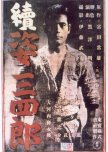
This review may contain spoilers
Not as entertaining as the original
Sanshiro Sugata Part II was a pale reflection of the original Sanshiro Sugata from 1943. While the original was fun and had a solid story arch, the sequel's story was thinner, more confusing, heavy on propaganda and not very entertaining.Sugata has been away for two years but hasn't learned much. He helps a young rickshaw driver when a drunk American sailor beats the boy. A Japanese fight promoter hears about the incident and invites him to compete against "Lister the Killer," an American boxer, but he declines. Unfamiliar with boxing, Sugata decides to watch a match and is disgusted by the showy sport, alluding to it looking like dogs or roosters fighting. He returns to the dojo where Higaki Gennosuke's brothers show up looking for a battle with him. Sensei Yano sends the rude brothers away. "The man who knows not himself knows nothing." Later, Higaki Gennosuke whom Sugata defeated in the previous film, who is quite ill but healed in spirit pleads with Sugata to stay away from the unbalanced brothers. Sugata has been suffering from self-doubt wondering whether he should give up judo because of the harm that comes to his opponents but he also wants to fight whenever he can which leads to him not sleeping. He's also concerned about the survival of Japanese martial arts. The three laws of the dojo state that no one is to drink in the dojo, no fighting for money, and no fights without the sensei's permission. Suffice to say he breaks all three, fighting both the American and the crazy karate brother.
This sequel's fights weren't as well done or exciting. The final battle on the snowy mountain was hard to see as the bodies were dark silhouettes on the white background. In the first film, the contests furthered Sugata's growth, in this film, they all seem to be about promoting Japanese martial arts as superior to other forms.
Where Sugata traveled a spiritual path of self-discovery in the first film, he seemed completely confused and erratic in this one. The propaganda was heavy-handed, though it was understandable in the waning days of WWII when the writing was on the wall. While I could easily recommend the first film, this second one may be more for Kurosawa completionists.
8/11/23
Was this review helpful to you?

 54
54 188
188 11
11






















